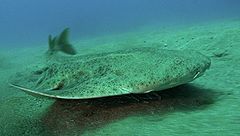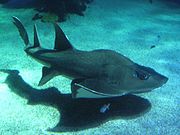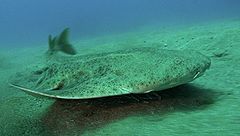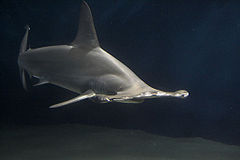Category Archives: Sharks & Rays
Illegal massacre of almost 300,000 sharks
The Asian demand for shark fin soup has risen drastically over the years, and is the contributing factor for the massacre of nearly 300,000 sharks off of Brazil.
The Brazilian Environmental Justice Institute has officially accused Siglo do Brasil Comercio, a well known exporter of sea food, of engaging in the illegal massacre of almost 300,000 sharks.
The group is actually taking them to court, and demanding compensation for what it says is “massive damage to the marine ecosystem”.
The group has alleged that most of the sharks were pulled up out of the water, had their fins removed, and then simply dumped unceremoniously back into the water.
The environmental group is going to be suing Siglo do Brasil Comercio for a princely sum of $790 million in damages, for its ill gotten sale of some 290,000 sharks since 2009.
“As we can’t put a value on life, we have calculated the impact on the ecosystem,” explained Cristiano Pacheco, the director of the group. “We think the sharkfins were exported clandestinely, in containers, likely from the ports of Rio Grande do Sul to the Asian market,” Mr Pacheco continued.
It is not legal to take the fins off the shark and them dump their carcasses overboard in Brazil, however they bring in a pretty penny from Asian diners, who use the fins in soups. In fact, some say that these self same Asian diners are encouraging the practice of taking only the shark’s fins, and throwing the rest back into the water.
Experts Backing Law Which Bans Shark Fishing
Conservationists and researchers are lashing out after the 11th fish was killed in BDA waters in the past week.
Are sharks dangerous man eating monsters, an excellent source for protein, or just another example of humanity being cruel and exploiting the oceans?
An 11 foot tiger shark being hacked to bits on a dock in Somerset this week really got the juices flowing in a lot of people.
The children seemed to be at ease, eagerly awaiting their turn to have their photo taken with the beast, however some other concerned citizens have said that the endangered animal had simply been killed for the sport of it.
The owner of the SCUBA firm Blue Water Diving, Michael Burke, has said that he believes that Bermuda should follow Palua and the Maldives example, and protect sharks through legislation.
He explained: “I really don’t see the need to catch a tiger shark. There’s very little use for them. It is not a good eating fish.
“We don’t need to do that anymore. It is a different world we live in.
“Those images of hunters standing with their feet on a lion’s head as some sort of trophy, it is an anachronism.
“Palau has banned shark fishing, we could do the same. We did it for turtles in the 1800s, why not sharks?”
Experts, and the local community seem to be in agreement with him, and will soon have a vote to see about banning the killing of these endangered sharks.
Fishing Experts Claim: Shark Numbers Could Increase Drastically!
It has been warned that if a federal fishing ban along the east coast of Australia gets approved, then the sharks will go up in number exponentially, and the price of seafood will more than double.
This warning was issued yesterday by fishing experts and seafood industry veterans, during a firestorm of opposition to the establishment of the eight “no take” marine protection zones. These protection zones would also include a zone off of the Tweed Coast, stretching in commonwealth waters from Southern NSW to Torres Strait.
This idea was met with opposition by Paul Burt, a local fishing expert, as he warned that if fishing was banned in that particular area that more sharks would breed and head into those waters seeking the safety they offer..
“A lot of attacks that occur with sharks … occur where the marine parks are situated,” he began.
“The fish life flourishes so much that it does become an uncontrollable habitat.”[sic]
What winds up happening in these :”uncontrollable habitats” is that there will be an increase in the fish population, and this would lead to more sharks, he went on to explain.
Peter Peters, a seafood industry veteran, who also just happens to be the owner of Peter’s Fish Market located at Main Beach, has commented that imposing more limits on where commercial fishing boats can fish might make the prices of seafood skyrocket to the extent that it would be unaffordable for many ordinary Australians.
“I would say it would definitely double the price because the fishermen won’t be catching as much, their costs of traveling extra distances will go up and that will be passed on,” he explained.
Well, deliberation will continue, hopefully the outcome won’t rely solely on one side of the story…
A Rare Shark to Become Stud In Minnesota
A rare shark, a shark-ray (Rhina ancylostoma), has traveled an astonishing 6,000 miles to end up at the Underwater Adventures which is located in the Mall of America. The purpose of its visit? Well this has to be a first in history.. It has traveled all this way to be a “stud”.
Yep, it’s true, this rare 6 month old shark is about to be pushed into becoming a father. It will be joining a female in the same aquarium, and it is hoped the two will hit it off well.
“We are really excited to have him. These guys are very rare to have in captivity and the fact that we have a pair is even more exciting,” said an employee with Underwater Adventures, Carol Byrns.
Byrns has suggested that the female shark, dubbed “Lola” would benefit from having a “Latin Lover” so they have sneakily named the male shark “Rico”.
“Rico” was reeled in as a baby by fishermen in Japan, and he won’t be going on display in the main aquarium just yet.
“He’s pretty small yet so he’s going to probably be in holding for quite a while until he grows up,” Byrns explained.
She went on to explain that should guests wish to view him, they will be able to do so if they take the “behind he scenes” tour offered by Underwater Adventures. So it appears that while “Rico” is expected to propagate the species with “Lola”, he is still not big enough to go on for show…
Shark-rays are noted for being extremely rare, and it should be noted that they have never been bred successfully in captivity.
Fishermen Reel In Rare Catch, “Could be last of its kind”
Fishermen have managed to reel in an edangered species of shark off Plymouth and experts are saying that it could be the very last of its kind swimming about the UK waterways. It very well might be. The angel shark is classified as a “critically endangered” species, and has been believed to be extinct in the North Sea, and is very nearly so in other areas of the Mediterranean. It is thought that there are large pockets of them floating around the Canary Islands, and many environmentalist groups are pushing for urgent action to prevent this magnificent species of shark from disappearing off the face of the planet.
The extraordinary catch, identified as an angel shark, was brought ashore to the Barbican Fish Quay market this past Tuesday.
Some resident experts at the Marine Aquarium has said that this is the first time an angel shark has made an appearance in a UK fish market since 1998.
In April of 2008, the UK Government granted the angel shark full protection under the Wildlife and Countryside Act. This means that it is illegal to fish them, trade them, export them, and sell them. However, the animal has yet to be added to the OSPAR Priority List of Threatened and Endangered Species, even though the proposal to get it on there was deemed appropriate the by Study Group on Elasmobranch Fishes, the general motion was quashed and the nomination rejected.
The fisherman who reeled in the shark, got into contact with the aquarium to tell them of the mistake – that they had inadvertently reeled in an angel shark which was about 1.2 meters in length.
An employee of the aquarium, John Crouch, explained: “Globally this species is listed as critically endangered and it was thought to have been fished to extinction in the North Sea in the 1990s.”
“This may well be the last of its species ever to been seen in UK waters.”
He went on to explain that this species of shark are especially vulnerable to accidental fishing, such as bottom trawling, because they generally prefer to make their homes in shallower waters closer to shore and are sometimes caught by any number of fisheries in the area.
He went on to add: “The angel shark is especially vulnerable due to its very long life span, around 35 years, and the fact that they do not mature until they are in their teens.”
“That’s a very long time to evade being caught when each fishable part of the North Sea is trawled seven times each year. It is thought that there are still populations of this species around the North of Africa and off the Canary Islands which is perhaps where this one came from.” John went on to explain that most of the native shark species have seen a recent decline of 90 percent since the 20th century began due to overfishing and hapless fishermen.
“Nay” to the regulation of shark fishing from the shoreline
Indian River County – The recent proposal to regulate shark fishing from the shore, may be at an impasse.
Following two months of heated discussions, the majority of the County Commission voted on Tuesday to reject Alan Polackwich’s, County Attorney, draft ordinance, without even allowing the courtesy of a revision.
“(Am I) disappointed? I can’t understand it,” Doug Distl, Carlton condominium manager commented, “This is Indian River County. We’re known for recreation, retired citizens and good things.”
Distl, who submitted his own proposal to ban the baiting and chumming of sharks off the beaches where people swim, has said that he didn’t want the county to become known as a shark fishing destination.
He has said that he is now going to focus on just getting the Indian River Shores, Orchid, and Vero Beach councils to at least regulate shark fishing.
In a 3-2 vote, the commissioners effectively shot down Polackwich’s draft. The motion to reject the proposal was made by Vice Chairman Bob Solari.
This rejection came after the commission had asked Polakwich to revise his proposal and put more focus into it on June 15th. Rather than banning shark fishing and chumming, the commissioners were after authority for lifeguards and sheriff’s deputies to order shark anglers to move their activities off the swimming beaches, and into remote areas.
Who Needs Men ?!
Now this is an interesting development! Two female zebra sharks, located at the Vinpearland Park Nha Trang, laid eggs without the need for male sharks! After a long wait of 5 months of incubating the eggs, the very first unisex baby shark was born!
The tank where the two female sharks have made their home for the past year has no male sharks in it. However, the first female shark, much to the surprise of the keepers, laid her eggs and a baby shark was born near the end of June.
The Oceanography Institute researchers in Nha Trang have explained that this is a very rare occurrence in nature and this is the very first time that a unisex shark has made an appearance in Vietnam. Not to be outdone by her tank partner, the second female shark laid close to a dozen eggs, of which over half of them didn’t have citellus. The others with citellus can actually develop embryos, and, with great excitement, the scientists at the Vinpearland Park are incubating these eggs to see what develops.
An expert at the Oceanography Institute has shed some light on the aspects of asexual reproduction. They explained that asexual reproduction occurs when the eggs develop an embryo without any interaction, or contact with sperm from a male. This is rather common in the insect world, however it is extremely rare is fish and reptile species, and has never been seen before in any kind of mammal. “Until now sharks have not been listed as animals with asexual reproduction. This phenomenon has only been recorded once in the US and only a few times around the word. We need to perform a DNA test to verify what happened,” the scientist continued.
85 Different species of Shark Have Been Genetically Fingerprinted

The DNA mapping of these sharks is thought to be rather significant in terms of being able to identify the most threatened species. Now it will be easier to help manage programs to save them. The program is being headed by the Ministry of Earth Sciences, and is part of an ongoing survey and assessment plan for mapping deep sea species in the Indian Ocean.
India is currentlt the second largest shark fishing nation, many species of shark are killed for their fins, oil and their meat.
The actual genetic fingerprinting of the sharks was done by a team of scientists from the Central Marine Fisheries Research Institute in conjunction with the Kochi regional center of the National Bureau of Fish Genetic Resources in Lucknow.
The shark samples were collected in the Gujurat, Tuticorin, Conchin fisheries harbour and also the Neendakara fishing harbour. The researchers were performing the fingerprinting under the direction of the N.G.K. Pillai, of the Pelagic Fisheries Division of the Institute, along with the help of A. Gopalakrishnan of the bureau. Other members on the team included K.K. Bineesh, K.V. Akhilesh and K.A. Sajeela.
This genetic fingerprinting will greatly aid in the identification of the different shark species from tissue samples. Most shark species are found at a depth of around 250 meters and little is actually known about them. This project is aiming to change that, and bring the sharks into the public eye.
Animal Lovers Rejoice! Historic Shark Fin Ban!
On July 1st, Hawaii became the first government in the world to institute a law to ban the sale, distribution and even possession of shark fins, the news is sending ripples all around the globe, and animal advocates everywhere are cheering, and ramping up their efforts to get their governments to do the same.
This new law means that restaurants in Hawaii will not be able to serve shark fin soup, a real delicacy, but the implications are so much greater than a few items on a lunch menu.
The shark has made the jump from predator and food source, to being protected. The new law instituted in Hawaii is aiming to prevent shark finning, a rather gruesome process where, once caught, the fins are removed from the shark, and the rest of it is thrown back overboard.
State Senator, Clayton Hee had this to say about the momentous occasion, “As far as I’m concerned it’s no different than killing an elephant for its tusks or de-horning a rhinoceros for its horn. These are cruel and inhumane practices that have no business in a civilized world”.
It was Senator Hee, with the support of many animal rights advocates, which managed to drum up the votes to make it illegal to have, serve, buy, or sell shark fins.
Other States, such as California, are starting to jump on the band wagon, and even other countries are talking about creating similar laws.
Not surprisingly, China is where a lot of the efforts are being made. WildAid launched a campaign in China using NBA superstar Yao Ming, to get people to stop buying shark fins, and stop eating shark fin soup.
Whale of a Shark Caught!
The world record for a shark being landed by a fishing rod, has just been broken by two Danish fisherman. Per Jensen and Henrik Hansen successfully landed themselves an 880 kilo, 4 meter and 10 cm Eqalussuaq (also known as a Greenland Shark, or Somniosus microcephalus) in Norway’s Bokna Fjord. The Bokna Ford is in Rogaland County, between Stavanger and Haugesund.
The previous record for such a rod caught shark was said to be in the neighborhood of 775 kilos.
When asked about the adventure, and overall catch, Henrik Jensen responded, “It all went very well”.
The two Danish fisherman had made their way to the Bokna Ford, as they had recently heard that rather big Greenland sharks were prowling the waters. As to the bait? They simply used an empty potato sack full of plaice.
The Greenland shark is not generally considered edible as its flesh is toxic and contains timethylene oxide, which when ingested causes the same symptoms as being drunk as a skunk.
It is interesting to note that if the Greenland shark is prepared in a rather difficult process, it can be eaten, and is even considered a delicacy in Iceland (even more so in Greenland) where the fish, which is not normally a danger to humans in general, is closely tied into the Inuit folklore.








